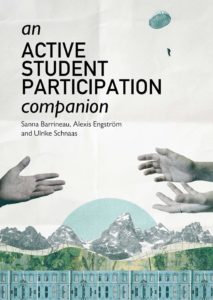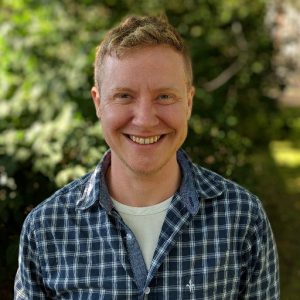Course Coordinators at CEMUS explore ways to challenge traditional academia and create innovative, insightful and inclusive education.
Here at CEMUS, Course Coordinators have jointly created and participated in a Course Coordinator Series that aims to share knowledge, experience, and best practice in the planning and preparation phases of autumn courses. Building upon a model of active participation, the Course Coordinator Series comprises of multiple workshops that engage staff in dialogue on questions of education for sustainable development. We explore our roles as coordinators, asking questions on how it affects the way education designed and conducted. We aim to provoke reflection upon how we can build upon the unique model of Active Student Participation here at CEMUS, facilitating students in becoming resources for each others’ learning. We seek to break the expert/student barriers within education by valuing all knowledge in the classroom, and in doing so empowering students to co-create learning.
Fitting with the collaborative environment central to the CEMUS model, coordinators collectively explore various themes to help develop challenging and interdisciplinary courses that grapple with the complexities of sustainability and the modern world. CEMUS runs four Course Assemblies that facilitate brainstorming around central pillars of course design, these are 1) Course themes and content; 2) Literature; 3) Examination; and 4) Pedagogy and didactics. Alongside these assemblies, coordinators choose to participate in 3 of the 9 elective sessions that have been developed as part of the Course Coordinator Series. These are:
- Active Student Participation at CEMUS – ways of involving, engaging and enraging students, May 14
- Gender, Intersectionality and Norm-critical Education, May 8
- Sustainability and Climate Change Education – starting points and ways forward and The Course Coordinator Role and Mission – navigating balmy and choppy waters at CEMUS
- Multi-Inter-Trans-Disciplinary Methods and Processes at CEMUS – transcending boundaries and breaking down walls
- Reading, Writing, Revolution – honest education, reckless talk and challenging students
- Deep Adaptation and Education for Survival – between hope and a hard place
- Extinction Education – the myth of human supremacy (Jensen) and the love of nature
- Fact-Based Education and Calculating The End Of The World – carbon budgets, footprints of giants and the changing nature of facts
- CEMUS and Sustainability Myth Busters
Active Student Participation at CEMUS – ways of involving, engaging and enraging students, May 14

The Course Coordinator Series continued this week with a session centred on Active Student Participation (ASP), led by our very own Director of Studies Alexis Engström. Alexis also works with the Division for Quality Enhancement, Academic Teaching and Learning. Along with another of our colleagues, Sanna Barrineau, they have published ‘an Active Student Participation companion’ to inspire co-creative ways of learning. The book is available here.
The purpose and style of education, along with pedagogical techniques were core themes of the elective session. Coordinators worked together to explore three central questions:
- What is the purpose of education at CEMUS?
- What are the characteristics of a good teacher and a good student?
- Why is Active Student Participation a useful pedagogical and educational method?
The session started by looking at different discourses of education and the potential challenges, they pose for education. For example, the idea of students as consumers who pay tuition fees in return for qualifications and skillsets. It makes assumptions that both teaching and learning are evidence-based, and are subject to quality measurement and quality assurance. These assumptions have implications for who can be an educator and what kinds of knowledge are legitimate within higher-level education.
However, in the context of sustainability challenges that are complex, multi-scalar and multi-dimensional, we explored why education ought to be conceptualised and practiced in different ways, and how we can value the contribution of different knowledge. Course Coordinators highlighted that in a fast-changing, digital world, the way people understand and relate to modern-day issues is also evolving. Despite this, academic institutions are still educating students for the industrial era, with skills and knowledge that are not equipped to grasp these complexities. Rather than being interdisciplinary, the need for accreditation produces education around silo disciplines, which are poorly equipped to grapple with the complex challenges that transcend academic boundaries.
Active Student Participation (ASP) is a radically different way of teaching and learning based upon reciprocal and collaborative practices. ASP refers to the process of learning, and emphasises the role or peer-to-peer learning and students as the co-creators, co-planners, and co-implementers of education. ASP stresses the importance of students as resources in each others’ learning, where different knowledge, skills and worldviews become assets in the educational space. Rather than simply reproducing knowledge, ASP emphasises that the purpose of education is to transcend and critique social norms, values and behaviour by utilising and interacting with different epistemologies, methodologies, theories and worldviews.
In relation the purpose of education, Course Coordinators then brainstormed what the characteristics of a good teacher could be and discussed the role of Course Coordinators in facilitating Active Student Participation. The role of an educator immediately moved beyond an ‘expert’, to someone is willing to engage, facilitate and explore alongside students. Course Coordinators reflected on their own multiple roles as observers, learners, peers, planner, designers, administrators, critical friends…and the list goes on. Some qualities raised as important in participatory higher-level education were: the ability to ask the question ‘why’ and to be reflexive; not taking ‘experts’ and information at face value; the ability to create a safe environment where students can raise difficult questions; facilitating curiosity; treating students as individuals with different needs and learning styles; recognising and utilising diversity.
Talking about the roles of educators and students highlights the difference between an institution that ‘listens’ to students and an institution that values students as ‘change agents’ and ‘active collaborators’ in education. In addition to rethinking the roles of educators, ASP further prompts us to rethink the characteristics of ‘good’ students. Importantly, Course Coordinators discussed what is ‘good’ in relation to education. What is success and failure? How do we measure success? By problematizing the fundamental notion of ‘good’ students, we immediately began to think about the purpose of education and the context of learning, which may be entirely different for different individuals. ASP as a pedagogical technique emphasises the importance of agency in the learning process and is therefore a fruitful approach to interdisciplinary and collaborative education needed to address complex sustainability challenges.
Gender and Norm-Critical Education, May 8

Warren Kunce joined CEMUS course coordinators this spring to discuss Gender and Norm-Critical Education. Warren has been an important voice at Uppsala University in addressing biases and discrimination inherent in the practices of academia. Writing an ‘Introduction to Gender Identity and Gender Expression’, Warren seeks to expel the misinformation around gender identity to help create fair, inclusive and safe educational spaces. You can find a link to the handbook here and more information about Warren’s work on Gender Diversity at this address https://www.genderdiversity.se/
When asked about the importance of gender and norm-critical education, Warren says:
“Norm critical approaches to gender diversity and other facets of higher education are vital because norms affect who gets to create knowledge, which knowledge is passed on and what types of knowledge are considered legitimate and important.”
A ‘norm’ is something that is considered normal behaviour within a particular social group. Norms are constructed through culturally held beliefs and practices over time; they shape our everyday behaviour and condition us to think, talk and act in certain ways. Importantly, those who abide by these norms have access to greater privilege and power within society, which is no less true in educational spaces.
Stereotypes of what it is to be a ‘man’ and a ‘woman’ in society are examples of norms that give access to privilege and power. Ranging from norms that determine acceptable ways for men and women to dress, to speak, and to interact hugely affect biases against those who do not conform to these standards. However, as Warren’s workshop highlighted, gender identity is more than a binary choice of man and woman; and is not determined by anatomy. The way people identify with gender is unique to one’s self. The way people express their gender, through the way they dress, their mannerisms, their names and pronouns, their facial, and body hair etc. should not lead to exclusion or discrimination. The simple example of using pronouns “he” and “she” in educational material highlights how individuals who do not conform to these identities are excluded, and as educators we should understand how this affects whose knowledge is legitimised in the classroom.
In education there exists a myth of objectivity, a view that we are able to leave our identity with our perceptions, assumptions and beliefs at the door. However, Warren’s workshop highlighted that approaches to education often neglect the influence of identity and the way it determines our approach to the classroom; the way it affects who we interact with, and how we interact with both course content and different people.
Understanding what norms are present is an important first step in being norm-critical. Norm criticism refers to methods and theories that are used to deflect attention from those who do not comply with certain norms to the actual norm that is taken for granted. Norm-criticism is not merely concerned with representing the ‘under-represented’ or ‘alternative’ views in academia, but rather asking why is the ‘norm’ is the norm, and similarly, why the ‘alternative’ is considered alternative? To be norm-critical is about questioning what knowledge is legitimate and why. Rather than positioning the ‘other’ as pieces of a puzzle that must be forcefully fit into certain constructs of ‘normal’, we must strive to re-imagine education in ways that accommodate and constructively utilise diversity.
As course coordinators and pedagogues, we must be aware of how we frame problems and what stereotypes we may (unwittingly) promote. Similarly, we must engage students in doing the same in the classroom. In the workshop run by Warren, course coordinators used personal experience to think of times that their assumptions may have affected their thoughts and actions. The session got Course Coordinators to ask tough questions about their worldviews and confront everyday biases that may permeate their approaches to the classroom. For example, when we use collective identities such as ‘we’ and ‘society’ are we aware of who this includes and excludes? Is the absence of the ‘other’ problematic for how we approach certain issues? Thinking in this way allows us to understand what generalisations are made and what values these generalisations are promoting or undermining. The workshop provided Course Coordinators with food-for-thought on how education and academia can be challenged and re-conceptualised in ways that utilise the best of everyone’s knowledge and abilities; and how this can help us at CEMUS create interdisciplinary education that contributes to creating a better world.
